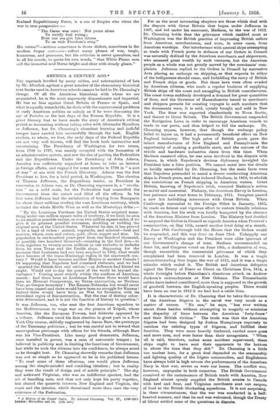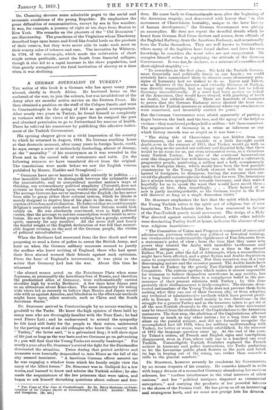AMERICA A CENTURY AGO.* TILE reproach levelled by many critics,
and substantiated of late by Mr. Altschul. against a great number of the elementary historical text-books used in American schools cannot be laid to Dr. Chamiing's charge. Of all the American historians with whom we are acquainted, he is the most supremely dispassionate and impartial. He has no bias against Great Britain or France or Spain, and what is equally remarkable, he deals with the controversial problems of early American politics as calmly as if he were discussing the age of Pericles or the last days of the Roman Republic. It is a great literary feat to have made the story of America's critical period so interesting without taking sides with Alexander Hamilton or Jefferson, but Dr. Channing's abundant learning and judicial temper have carried him successfully through the task. English readers, to whom, we fear, the early days of the Federal Republic are not very well known, will find the book both instructive and entertaining. The Presidency of Washington for two terms, from 1789 to 1797, was mainly occupied with the formation of an administrative system, and saw the rise of parties, the Federalists and the Republicans. Under the Presidency of John Adams, America was sufficiently organized at home to take an interest in foreign affairs, and engaged for some months in 1798 in " a sort of war " at sea with the French Directory. Adams was the first President to live, for a brief period, in Washington. The election of Thomas Jefferson, the Republican leader, as President in succession to Adams was, as Dr. Channing expresses it, a " revolu. tion " on a mild scale, for the Federalists had controlled the Government from the outset and filled all the offices. In his first term Jefferson had the satisfaction of buying from Bonaparte for about three millions sterling the vast Louisiana territory, which included the whole Middle West as well as the Mississippi delta :-
" By the Louisiana Purchase the United States acquired some- thing under one million square miles of territory, if we limit its area to its smallest possible extent, or over two million square miles, if we give it its greatestpossible extension, doubling or trebling the original area of the United States. Whatever its size, it has proved to be a land of riches : animal, vegetable, and mineral—beef and mutton, wheat, corn and cotton, gold, silver, copper and zinc. Its population in one hundred years grew from one hundred thousand, or possibly two hundred thousand—counting in the Red Men—to from eighteen to twenty-seven millions as one excludes or includes from its area Texas and the Pacific slope. Supposing for the moment that Louisiana had not been acquired in 1803, what would have become of the trans-Mississippi region in the nineteenth cen- tury ? Would it have become another Mexico or another Canada ? Or supposing that Napoleon had remained obdurate, and we had
married the British fleet and nation,'—as Jefferson had hinted we might. Would not to-day the peace of the world be beyond dis- turbance ? Coming more strictly within the confines of American annals : had there been no Louisiana Purchase there would have been no Missouri Compromise, no Texas annexation, no Mexican War, no Oregon boundary I The Kansas-Nebraska Act would never have been passed and there would have been no struggle for Kansas ! Indeed there would have been no War for Secession with its attendant orgies of Reconstruction. But the star of destiny other- wise determined, and it is not the function of history to question.'i It was Jefferson, too, who sent the first American squadron to the Mediterranean to wage war on the pirates of Tripoli, whom America, like the European Powers, had hitherto appeased by a tribute. Jefferson owed his first election in great part to a New York City caucus, skilfully engineered by Aaron Burr, the prototype of the Tammany politician ; but he was careful not to reward that unscrupulous personage with offices for his friends, although Burr was his Vice-President. Like many good democrats, Jefferson, once installed in power, was a man of autocratic temper ; he believed in publicity and in limiting the functions of Government, but while he took the citizens into his confidence, he always acted as he thought best. Dr. Charming shrewdly remarks that Jefferson was not so simple as he appeared to be in his published letters. " To read some of these effusions, one would place Jefferson among the simple-minded and confiding idealists ; but in reality they were the result of design and of subtle principle." The shy and awkward Virginian, who was an indifferent speaker, had the art of handling men, and thus not only kept his party together, but abated the quarrels between New England and Virginia, the coast and the interior, which threatened more than once the very existence of the Federation.
• A History of the United States. By Edward Charming. Vol. IV., 1789-1815 Loudon: Macmillan and Co. 11213. net.j For us the most interesting chapters are those which deal with the dispute with Great Britain that began under Jefferson in 1807, and led under his successor, Madison, to the war of 1812. Dr. Charming holds that the grievance which rankled most at Washington was the British practice of impressing British sailors from American merchantmen, and even, in some cases, from American warships. Our interference with neutral ships attempting to trade with French ports in defiance of our Orders in Council was naturally disliked by the American merchants and shipowners, who amassed great wealth by such ventures, but the American people as a whole was- not greatly moved by the merchants' com- plaints. Jefferson replied to the Orders in Council by successive Acts placing an embargo on shipping, so that exports to either of the belligerents should cease, and forbidding the entry of British and French ships or goods. But these laws were often evaded by American citizens, who made a regular business of supplying British ships off the coast and smuggling in British manufactures. The coast towns suddenly developed a demand for great quantities of flour, and the Governor of Massachusetts issued to merchants and shippers permits for coasting voyages in such numbers that the documents were, it is said, openly bought and sold in New York. The flour was exported clandestinely to Nova Scotia, and thence to Great Britain. The British Government suspended the Navigation Laws in order to encourage American vessels to trade to our ports, and thus helped to foil the embargo. Dr. Channing argues, however, that though the embargo policy failed to injure us, it had a permanently beneficial effect on New England industry. The high price of British goods gave the infant manufactures of New England and Pennsylvania the opportunity of making a profitable start, and the success of the textile and hardware industries dates from this time. When Madison assumed office, he was soon involved in the dispute with France, in which Napoleon's devious diplomacy inveigled the President into a false position. We cannot enter into the details so lucidly unravelled by Dr. Charming, but the main facts were that Napoleon pretended to annul a decree confiscating American ships in French ports, and thus induced Madison, in 1810, to abolish the restrictions on French shipping in American waters. Great Britain, knowing of Napoleon's trick, resented Madison's action as unfair and unneutral. Pinkney, the American Envoy in London, lost patience and went home in February, 1811. Congress passed a new Act forbidding intercourse with Great Britain. When Castlereagh succeeded to the Foreign Office in January, 1812, he made an honest and vigorous effort to restore friendly relations with America, but his work was fatally hampered by the absence of the American Minister from London. The Ministry had decided to suspend the Orders in Council as regards America when Perceval's assassination, on May 11th, caused another fatal delay of a month. On June 16th Castlereagh told the House that the Orders would be suspended, and this was done on June 23rd. Unhappily our Envoy at Washington and the President were alike ignorant of our Government's change of tone. Madison recommended on June 1st, and Congress voted on June 18th, a declaration of war, though meanwhile the commercial grievance of which they complained had been removed in London. It was a tragic misunderstanding that began the war of 1812, and it was a tragic mistake which ended it. The British and American delegates signed the Treaty of Peace at Ghent on Christmas Eve, 1814, a whole fortnight before Pakenham's disastrous attack on Andrew Jackson's entrenchments at New Orleans. The Transatlantic) cables have indeed contributed more than is supposed to the growth of goodwill between the English-speaking peoples. There would have been no war in 1812 if we had had a cable then.
It is characteristic of Dr. Channing that he takes the successes of the American frigates in the naval war very much as a matter of course. " No one," he says, " has ever written about these battles without attempting to magnify or minimise the disparity of force between the American forty-fours' and their British victims." The truth was that the American frigates had been designed by Joshua Humphreys expressly to outclass the existing types of frigates, and fulfilled their function. They were more heavily timbered, carried more guns and more men, and were faster than their antagonists. " When all is said, therefore, unless some accident supervened, these ships ought to have sent their opponents to the bottom in about the time that they did." Dr. Channing is a little too modest here, for a great deal depended on the seamanship and fighting quality of the frigate commanders, and Englishmen have always held in high esteem the performances of the American Navy in that war, severe as were our losses. The conflict was, however, unpopular in both countries. The British Government connived at the maintenance of British trade with America, Now England almost openly supplied the British armies in Canada with beef and flour, and Virginian merchants sent out cargoes of food to the British blockading squadrons. It is not surprising, in these circumstances, that the war was conducted in a half- hearted manner, and that its end was welcomed, though the Treaty of Ghent settled none of the questions in &mute.
Dr. Charming devotes some admirable pages to the social and economic conditions of the young Republic. He emphasizes the great difficulties of communication, except by sea in fine weather. It was, for example, a journey of eight or ten days from Boston to New York. His remarks on the planters of the " Old Dominion " are illuminating. The grandsons of the Virginians whom Thackeray described kept open house and lived like feudal lords on the produce of their estates, but they were never able to make ends meet on their scanty sales of tobacco and rum. The invention by Whitney, in 1794, of the cotton-gin, which made the cultivation of short staple cotton profitable, saved the South from financial collapse, though it also led to a rapid increase in the slave population, and thus greatly strengthened the fatal institution of slavery at a time when it was declining.



































 Previous page
Previous page